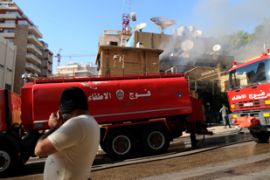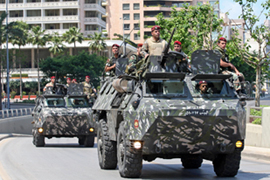Beirut streets ‘calm’ after clashes
Lebanese capital reported to be “calm but tense” after three days of fighting.

Lebanon’s governing coalition has described Hezbollah’s takeover of west Beirut as an “armed coup” aimed at bringing Syria back into the country and serving Iran’s interests, amid signs that the fighting is spreading outside the country’s capital.
| In depth | |||
|
The March 14 coalition said in a statement read out on Friday by Samir Geagea, leader of Lebanese Forces, a pro-government party: “The armed and bloody coup which is being implemented aims to return Syria to Lebanon and extend Iran’s reach to the Mediterranean.”
In Washington, Condoleezza Rice, the US secretary of state, reaffirmed backing for Fouad Siniora, the Lebanese prime minister, and said the US would “provide the support needed” to help him deal with Hezbollah’s actions.
The reactions came after Hezbollah and its Amal allies – both mainly Shia groups – took over Beirut’s Muslim sector, including almost every position and strategic building held by supporters of the March 14 coalition.
Sea port closed
By evening, clashes were reported from the southern city of Sidon and Hezbollah fighters were in control of Beirut’s main Al-Hamra shopping street.
Hezbollah took control of all roads leading to Beirut’s international airport, Lebanon’s only air link to the outside world.
According to Elie Zakhour, a port official, Beirut’s sea port was also shut down “until further notice” because of the situation, Lebanon‘s state-run National News Agency reported.
Government forces began taking up positions in some neighbourhoods in west Beirut abandoned by the pro-government groups.
An opposition official said the roadblocks placed by its supporters would not be lifted until the government rescinded its measures against Hezbollah and sat down for a national dialogue.
Another opposition spokesman threatened to attack what he described as the security centres of Walid Jumblatt, leader of the mainly Druze Progressive Socialist Party and a prominent Siniora ally, in the Chouf region of Mount Lebanon.
In a statement to Al Jazeera, Weam Wahab, a former Hezbollah minister, ordered the Lebanese army command to take control of the areas by Friday night, otherwise he would act to remove them shortly.
Hezbollah said it was infuriated by government allegations it was spying on Beirut airport and by the cabinet’s decision to fire the head of airport security.
Al Jazeera’s James Bays, reporting from Beirut on Friday, said gunfire erupted outside the city’s best known hotel, the InterContinental Phoenicia.
“This is a show of force by opposition fighters. They have taken positions next to a statue of Rafiq al-Hariri [the assassinated former Lebanese prime minister], and can be considered a statement to pro-government fighters that they are in control.”
He said that those killed were supporters of Arsalan.
 |
| Lebanese troops took control of several west Beirut suburbs from opposition fighters [AFP] |
“Gunmen surrounded the building, stormed into the garage and demanded that the army shut down the station,” a senior TV official said.
Lebanese troops evacuated the staff of the TV station’s terrestrial and satellite studios in the Kantari area of western Beirut.
Security sources said Hezbollah and allied fighters had overrun offices of Hariri’s Future business conglomerate across western Beirut.
The headquarters of the Future media group’s Al-Mustaqbal daily was also surrounded by fighters firing rocket-propelled grenades, setting fire to one floor, its managing editor said.
 |
| Jumblatt says the situation in Lebanon goes beyond the country’s borders [EPA] |
Gemayel urged Christians to stay away from the fighting and accused Hezbollah of staging a coup.
Separately, Jumblatt, the leader of the pro-government PSP, said in an exclusive interview with Al Jazeera’s Rula Amin, that he did not regret his backing for the removal of the head of security of Beirut airport, whom the government accused of being too close to Hezbollah.
“He said that the government should have undertaken these moves earlier, but predicts that the fighting will end soon,” Amin said, referring to Jumblatt.
“I did not anticipate such a strong response from Hezbollah, but … yes … the group is much stronger than other armed militias,” Jumblatt said.
He also said: “If you want to know what the next move for Hezbollah will be, ask [Mahmoud] Ahmadinejad [the Iranian president]. This situation goes beyond Lebanese borders.”
Normality urged
From the other side of the political spectrum, Michel Aoun, a Christian leader allied with Hezbollah, said that normality should be restored on the streets.
“The derailed carriage is now back on track. We hope from this point that things will fall back into the normal course [of events],” he said on Friday.
Aoun said he had sent a letter to Ban Ki-moon, the UN secretary-general, and various member states of the UN Security Council, but “did not find a clear response to avert the crisis”.
 |
| Opposition fighters took rapid control of many suburbs of Lebanon’s capital [AFP] |
On the diplomatic front, Saudi Arabia and Egypt have called for an urgent meeting of Arab foreign ministers to try to halt the violence.
“An emergency meeting of Arab foreign ministers in Cairo to discuss the crisis will be held in two days,” Hossam Zaki, the Egyptian foreign ministry spokesman, said on Friday.
The UN Security Council also called for “calm and restraint”, urging all sides to return to peaceful dialogue.
Syria, an ally of Lebanon’s opposition parties, said the dispute in Lebanon was an “internal affair” and expressed hope the feuding parties would find a solution through dialogue.
Al Jazeera’s Mike Hanna, reporting from Jerusalem, said: “The Israeli government does not view the current situation as a threat, but sees it as an internal matter.
“Israel, however, has always held the position that Hezbollah’s intent is to split Lebanon.”
